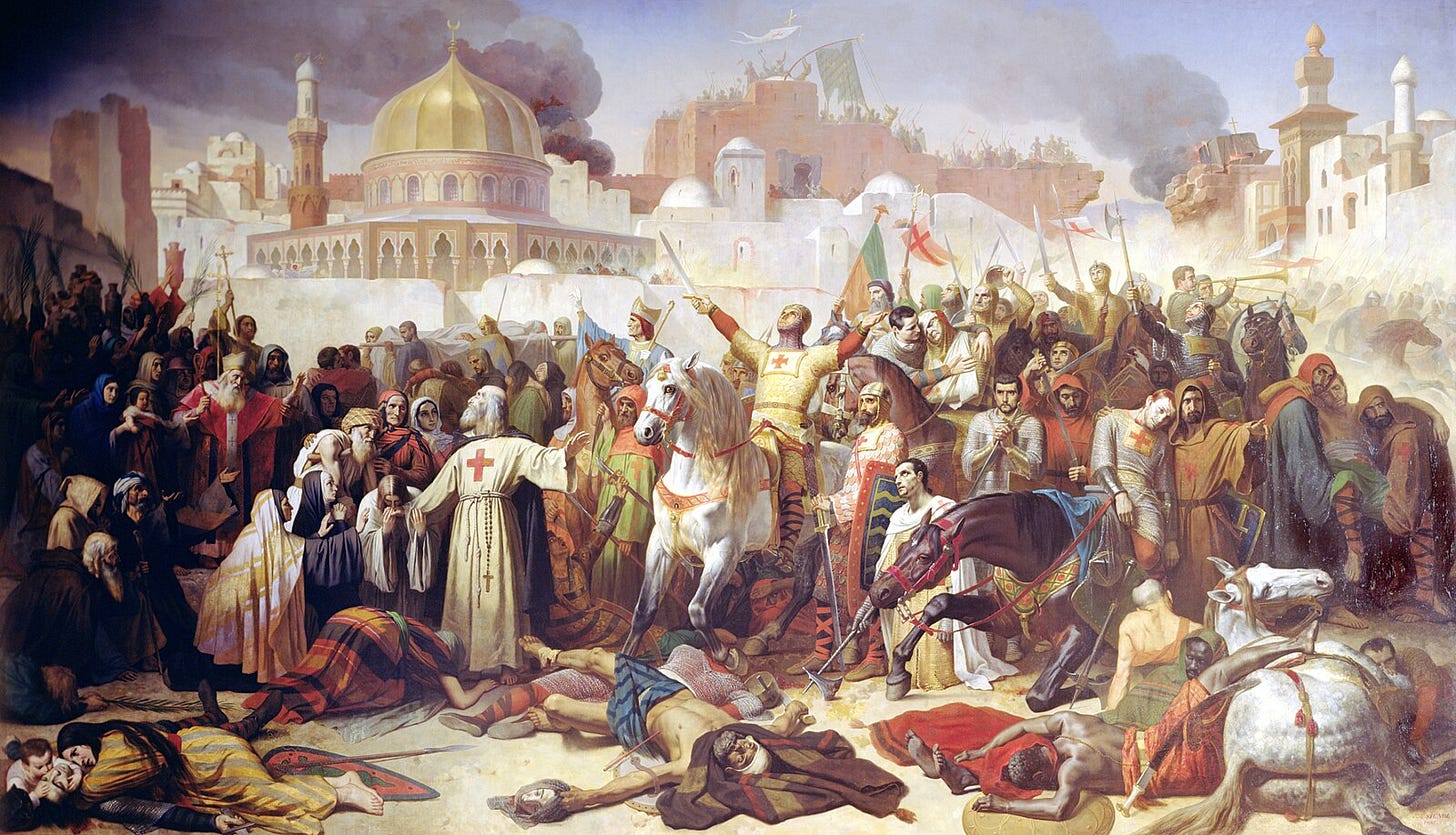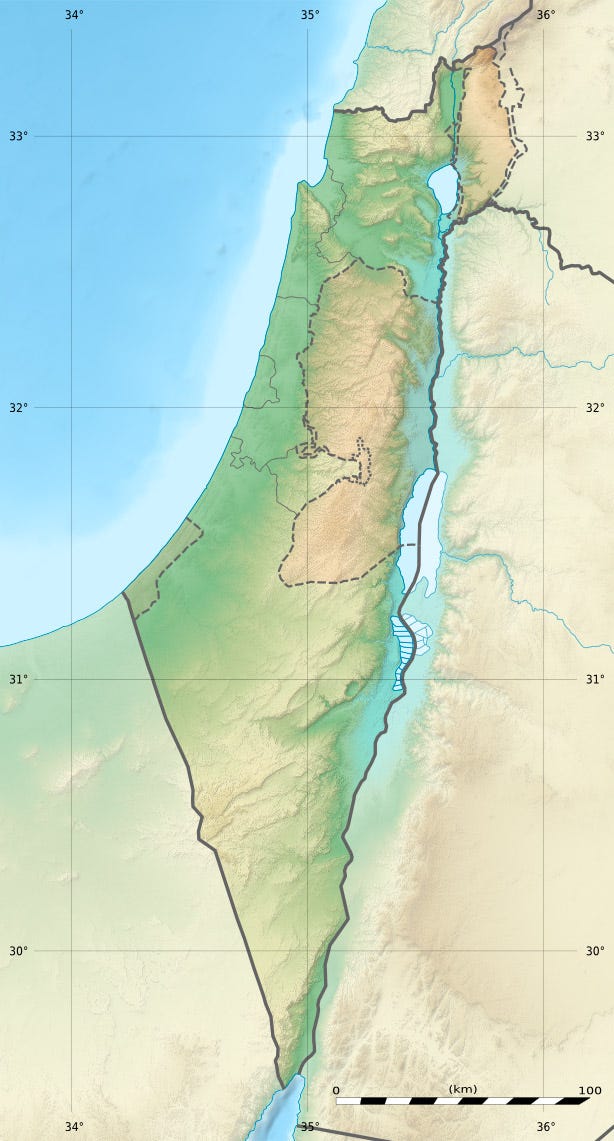On a scorching July day in Palestine Ludolf of Tournai clambered over the battlements and scattered his Fatimid foes. Ludolf fought wildly, desperately, he had endured years of suffering on behalf of his God to reach the Holy City. He had survived the arrows of Turkish horsemen as he thirsted on the Anatolian Plateau. He had braved the treacherous footpaths of the Tarsus Mountains, where a misstep had sent many of his compatriots tumbling to their deaths. He had endured the grueling siege of Antioch where he and his fellows ate their horses, then shoes, as starvation thinned their numbers.
And now he was the first of the Crusaders to step foot in Jerusalem, soon others would join him on the walls and then open the gates for the rest of the army. What followed was a scene of shocking slaughter as the Latin army, against all odds, achieved their aim and raised the cross over Palestine. For the first time in almost four centuries Christians ruled the Holy Land.
That they succeeded against the odds lead many to believe that God himself had ensured their success. However, Latin rule in what would become “Outremer,” was not to last, and an orgy of violence at the hands of Turkic warlords would mark their end less than two centuries later.
This end was as predestined as their early success, thanks to the iron will of geography.
The Capture of Jerusalem
The lands of Outremer were shielded from the interior by mountains, rivers, and the Dead Sea. Sea lanes to Constantinople & Italy connected them with wider Christendom. Although some terrain separated the Crusaders from inland it didn’t generally impede attacks. Crusader attacks on Muslim cities like Aleppo & Damascus ended in failure. Crusader forces were fragmented, too far from their power centers, & reliant on reinforcements from the West. On the other hand, the Muslims in these cities could call upon their coreligionists in the Syrian Desert, Egypt, Iraq, and Anatolia for aid. Unable to break out of the narrow coastal plain, the Crusaders were vulnerable & often forced on the defensive.
To reinforce their position, the Crusaders built networks of fortifications across their territory. These fortresses stymied Muslim attempts to push to the sea & provided a level of much needed strategic depth for the coast-bound Crusaders. The most famous is Krak de Chevaliers. Complicating the Crusader predicament was the problem of Egypt. Wealthy, populous, and with a history of invading the Levant tracing back to the Bronze Age, many Crusader efforts were directed at conquering the Nile.
This conquest would’ve made Outremer much more powerful & defensible. Recognizing the importance of taking Egypt, even the Byzantines offered naval assistance in one campaign. However, all attempts failed & Egypt was able to absorb the Muslim emirates in Aleppo & Damascus. Saladin’s brilliant victory at Hattin devastated the military forces of Outremer. In order to oppose the Ayyubids with equal numbers the Crusaders had brought almost all their fighting men to battle & were crushed. Saladin took the now-undefended fortresses with ease.
This collapse led to the 3rd Crusade. Richard the Lionheart & Phillip II succeeded in wresting some critical coastal cities and fortresses from Saladin but failed to retake Jerusalem. Now confined to an even narrower coastal strip, the Crusaders were at a greater disadvantage. Unable to successfully capitalize on the Mongol conquests & Crusader forces annihilated again at La Forbie, the walls started closing in on Outremer. Later crusaders had more seriously tried to take Egypt, a key conquest to ensure Outremer’s longevity, but these attempts failed. With the rise of the Mameluke Sultanate & the especially brutal campaigns of Baybars, the Crusader states began to crumble. Through trickery & brutality Baybars conquered the Crusader strongholds one by one. In 1291 his successors took the last stronghold at Acre.
In short; a lack of strategic depth & continued Muslim rule in Egypt doomed the Crusader states to eventual conquest. So long as a strong leader managed to unite Egypt & the Levantine interior the states on the coast were in existential danger. This is evident after examination.
By: Amitchell125 (Wikipedia)
By: Eric Gaba (Sting - fr:Sting) and NordNordWest (Wikipedia)
The Crusaders conquered the Levant in the wake of the chaotic Seljuk conquest. With Egypt controlled by the weakening Fatimids & the Holy Land controlled by the unstable Seljuks, the Crusaders were able to firmly root themselves. When Saladin reunified the inland Levant & Egypt he rapidly reduced the Crusader states. Only the 3rd Crusade & Abbuyid infighting between the Syrian & Egyptian factions saved the Crusaders from further losses, some expansion was even possible during the 1220s. However, the defeat of the Mongols & Mamluke conquest of the Levant from Egypt spelled the end of Outremer.
This security paradigm plays out repeatedly throughout history. When an imperial power enters the Levant from Egypt, Mesopotamia, Arabia, or Anatolia, independent states on the coast can’t survive. New Kingdom Egypt, Assyria, Persia, Alexander, the Ottomans, and others all exemplify this. It is also true that due to Egypt’s geographical position an imperial power almost always controls both the Nile & Levant. Both regions are bounded by seas & desert with few obstacles between them, encouraging a natural expansion into the other, rich & fertile region.
This danger is illustrated by the Israeli security predicament. Founded in the former lands of the Kingdom of Jerusalem, the Israeli state emerged victorious during the geopolitical chaos of the late 40s. However, this left Israel cornered on the narrow coastal strip, at points only 16 km wide. In successive wars the Israelis would seize the West Bank, Sinai, & Golan Heights, providing them with the rivers, inland seas, & mountains the Crusaders once used for their own defense.
Political fragmentation in the Arab world, shrewd Israeli diplomacy, & skill of arms have maintained Israeli control. In many ways this reflects the situation in the 12th century; a non-Muslim state with Western aid is able by arms & political chaos to establish itself. Much like Outremer, Israel needs to avoid a weakening of aid from the West, Egyptian unity with the Levantine Interior (as threatened by the short-lived UAR), or Iraqi/Iranian influence/expansion into the region.
In order to prevent a repeat of earlier wars, Israel has made huge efforts in seeking rapprochement with regional players like the UAE & Saudi Arabia. The recent war that has engulfed the region has put these vital diplomatic goals on hold. Iran’s expanding influence within the “Shia Crescent” from Yemen to Syria to Lebanon, has placed Israel into a security predicament not unlike that Saladin had placed the Crusader States in before the Battle of Hattin. Saladin slowly brought the inland regions of the Levant under his control like Damascus & Aleppo, isolating the Crusaders and unifying his subjects with proclamations of a Sunni Holy War to recapture Jerusalem.
As Israel reeled from Hamas’s attack in October 2023, Iran and her allies seized the opportunity. The Houthis in Yemen blockaded the Red Sea and curtailed shipping through the Suez Canal, the economic lifeline of Egypt, throwing its government into a serious predicament, and certainly forcing Cairo to question the viability of their current relationship with Israel. Hezbollah’s opportunistic attacks have forced Israel to invade Lebanon as well. Although Israel has been able to inflict devastating losses on the upper echelons of enemy leadership, Israel cannot afford to wage war forever and seeks a decisive victory that remains elusive.
It’s eerie how familiar it really is. The Crusader states & Emirates emerged after the successive imperial collapses of the Abbasids & Fatimids/Seljuks and warred with one another over the mountains to secure their kingdoms. Lebanon, Israel, Syria, & Jordan emerged after the successive imperial collapses of the Ottomans & British/French and have fought on the Golan Heights, Mount Lebanon, etc. in the shadows of the now-decaying castles of the Crusaders.
Who knows how it will end? But if history offers any guide, a new empire will be born on the great rivers of the Nile or Mesopotamia, in the endless sands of Arabia, or the rugged steppe lands of Anatolia or Iran, and begin the cycle once again.








Good analysis, I think you’re correct. My money would be on Iran. They seem to be capable of playing the long game. The dream of a United Arab Republic will have to wait for another century.
In the meantime I wait for editorials in the Israeli press calling to end the slaughter in Gaza—not for moral reasons, but out of concerns for self-preservation. Will they see the writing on the wall before it’s too late or are they fated to another long period of exile and diaspora?
Glad someone else noticed Outremer.